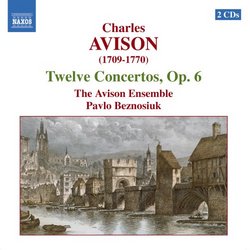| All Artists: Charles Avison, Pavlo Beznosiuk, Avison Ensemble Title: Charles Avison: Twelve Concertos, Op. 6 Members Wishing: 1 Total Copies: 0 Label: Naxos Release Date: 8/17/2004 Genre: Classical Styles: Chamber Music, Forms & Genres, Concertos, Historical Periods, Baroque (c.1600-1750), Classical (c.1770-1830) Number of Discs: 2 SwapaCD Credits: 2 UPC: 747313255320 |
Search - Charles Avison, Pavlo Beznosiuk, Avison Ensemble :: Charles Avison: Twelve Concertos, Op. 6
 | Charles Avison, Pavlo Beznosiuk, Avison Ensemble Charles Avison: Twelve Concertos, Op. 6 Genre: Classical
|
Larger Image |
CD Details |
CD ReviewsDOWN WITH HANDEL! DAVID BRYSON | Glossop Derbyshire England | 12/01/2004 (5 out of 5 stars) "Charles Avison was twenty-four years younger than Handel and twenty-three years older than Haydn. He was a Geordie, born in Newcastle-upon-Tyne. He went to London at an early age to receive lessons from Geminiani, himself a pupil of Corelli, and got himself into a spot of controversy by his robust claim that Geminiani was a better composer than Handel. The latter still dominated the London musical scene to a surprising extent even after his death and up to the time of Avison's own -- pasticcio-Handel oratorios such as Gideon were still being churned out -- and whether or not for that reason the ambitious Avison did not try to exorcise Handel's musical ghost from the capital but returned to the north, dying there in prosperous circumstances in 1770 at the age of 61. These twelve concertos were published in 1758, one year before Handel died. When they were written I don't know, but there is a definite sense of change and development in their style. The first six are all in the standard slow-quick-slow-quick format customary in the trio sonatas of Handel and other contemporaries. Of the remaining six only # 8 is to this pattern, and the style is definitely altering as well. The final gavotte-like `tempo moderato' of # 11 has a definite suggestion of Gluck to my ears, but in general what the idiom is starting to suggest is that of J C Bach, the so-called `London Bach', the sense of this being strongest in the opening movement of # 12, the longest piece in the entire set. It is all very pleasant stuff, not `great' music by any stretch of the term, but not routine or mechanical either. All twelve concertos are short, and the first six do not measure up anywhere near to the quirky masterpieces that Handel published with the same opus-number, whose influence can be heard in Beethoven's late string quartets and which were held up by such an orchestral virtuoso as Elgar as being a model of how to write for strings. The latter six are every bit as good musically as their predecessors, and have a strong historical interest as well. The Avison Ensemble are clearly a thrusting organisation, with an open membership which can be applied for via the email address and website provided. There are 11 players, and I assume that the seven parts in the concerto descriptions are made up of the five normal string sections plus the `concertino' group of four soloists plus the harpsichord continuo. Their director is Pavlo Beznosiuk whose work is new to me but who has a very impressive-looking cv already for a man who looks as if he may not be 40 yet. They are specialists, by definition more or less, and the playing is of the very highest professionalism, exactly what one expects from the superb current generation of early-music performers. The recording is absolutely excellent, and the liner-notes by Mark Kroll and Gordon Dixon are a model of their kind, except that something seems to have gone slightly wrong with the tempo-directions for the seventh concerto - track 1 has a final adagio section, and the music on track 2 is no kind of allegro but an andante or larghetto. This is music I am very pleased to have discovered, and a venture that deserves every success." Fine Music from a Forgotten Composer Ross Kennett | Narooma, NSW Australia | 03/30/2007 (5 out of 5 stars) "As I am in general agreement with David Bryson I can be brief. Charles Avison was all but forgotten, his only work that was in the calalogue was his 12 Concerti Grossi following the lessons ( keyboard sonatas ) of Domenico Scarletti. We should be thankful to The Avison Ensemble and Naxos for his revival, as well as this opus 6 they have recorded opus 3 and opus 4. This CD is well played, spirited, crisp and clear, and the music is not trivial, as least as good as his mentor's, Geminiani, later works. Like Geminiani many of the outer movements are melodic and lyrical. Opus 6 was published in 1758, late in the baroque period, and I agree that it improves as the disc progresses, with the final 3 or 4 concertos sounding a bit like the string concertos of C P E Bach? Unlikely, they were written about 10 years later. David Bryson suggests J C Bach, but he did not arrive in London untill 4 years after. Perhaps we should say they sound like a maturing Charles Avison.
I am happy to give it 5 stars, and look forward to more Avison, especially late works." |

 Track Listings (22) - Disc #1
Track Listings (22) - Disc #1